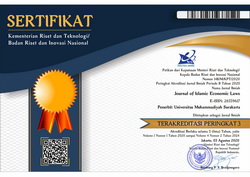ADOPTION OF EXTENDED THEORY OF PLANNED BEHAVIOR TO HALAL FOOD PURCHASING DECISION AMIDST COVID-19 PANDEMIC
DOI:
https://doi.org/10.23917/jisel.v5i1.15162Keywords:
Halal, Food, Pandemic, TPBAbstract
The Covid-19 pandemic has caused significant changes in people’s lives. One of them is the issue of non-halal food, which is suspected to be the initial cause of the Covid-19 transmission from animals to humans. This assumption is then indicated to impact changes in people’s consumption patterns. This study aims to see whether there has been a change in halal food consumption patterns as measured by purchasing decisions during the Covid-19 pandemic. The sample in this study is the people in Soloraya residency. Sampling technique using random sampling method with the distribution of e-questionnaire. The quantitative research method is carried out using the Extended TPB approach and processed with the Structural Equation Modeling (SEM). The results show that all constructs, namely attitude, subjective norms, perceived behavioral control, religiosity, and descriptive norms, affect the intention of a halal food purchasing decision. By using a Covid-19 pandemic condition as a dummy variable, the results obtained are differences in halal food purchasing decisions before and during a Covid-19 pandemic. This study found a pattern of changes in people’s consumption during the Covid-19 pandemic, where there was a tendency for people to choose halal food because it was more hygienic, healthy, and blessed.
Downloads
Downloads
Submitted
Published
How to Cite
Issue
Section
License
Copyright (c) 2022 Journal of Islamic Economic Laws

This work is licensed under a Creative Commons Attribution-ShareAlike 4.0 International License.



















